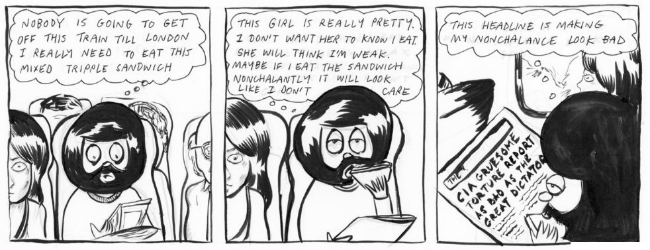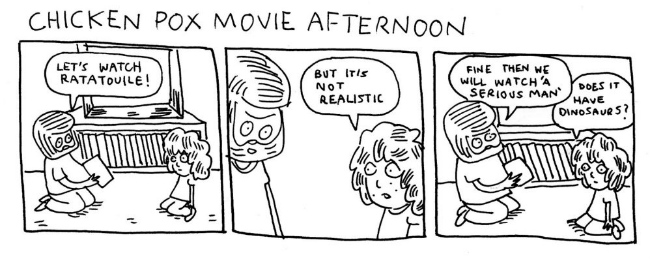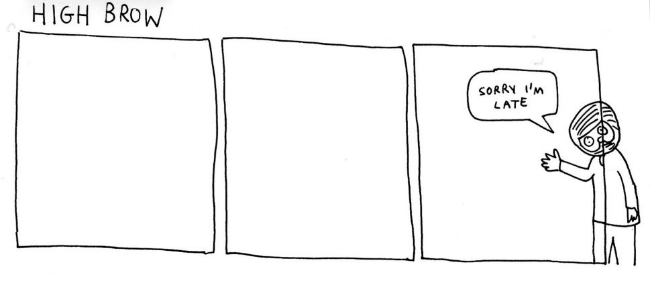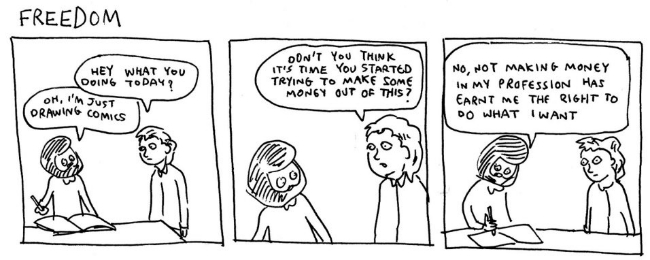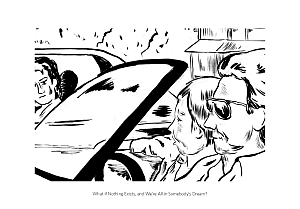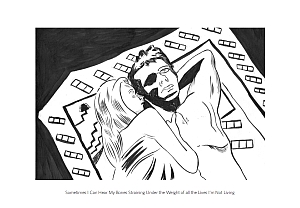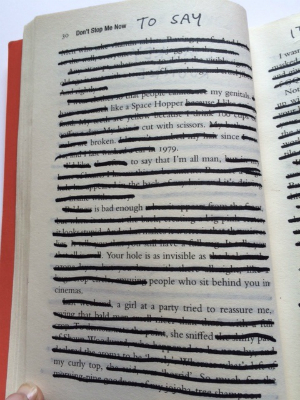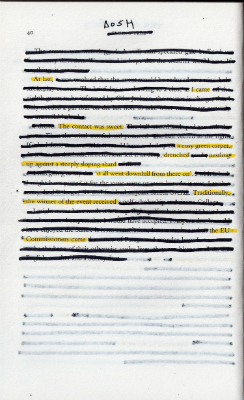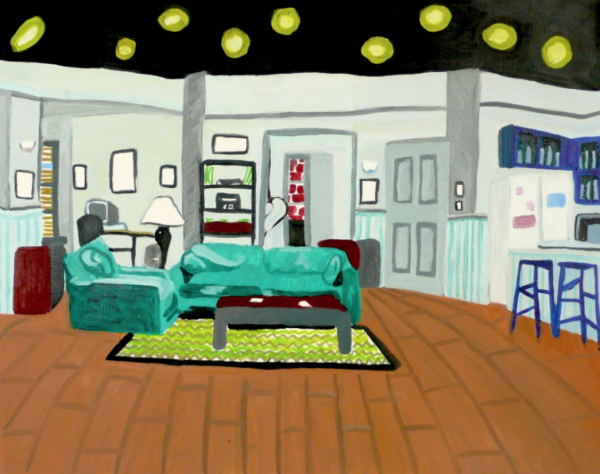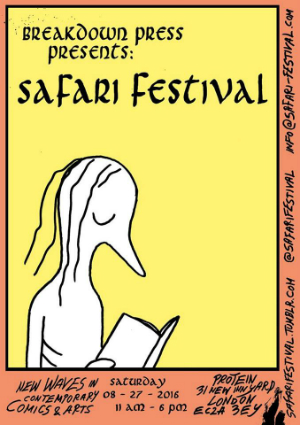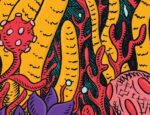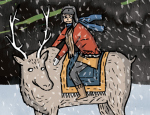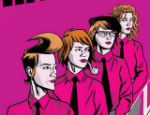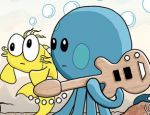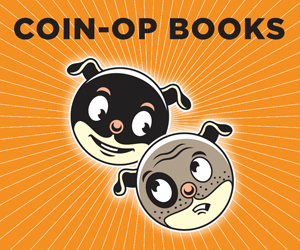SAFARI FESTIVAL FORTNIGHT!
Babak Ganjei’s artistic practice ranges from his satirical blackout poetry to his his powerfully honest autobio comics. His self-deprecating humour often makes telling points but he’s as comfortable utilising it for throwaway gags as he is for profound emotional statements.
His back catalogue to date has included involvement with the Steak Night anthologies, his slice-of-life strips about his relationship with his son and his painstaking re-creation of the Patrick Swayze film Roadhouse (with added philosophical commentary!). As part of our ongoing Safari Festival coverage at Broken Frontier I speak to Babak today about the intimacy of autobiographical work, those early Steak Night days and the identity of his next blackout poetry subject. Babak will be exhibiting as part of Anti-Ghost Studio at Safari.
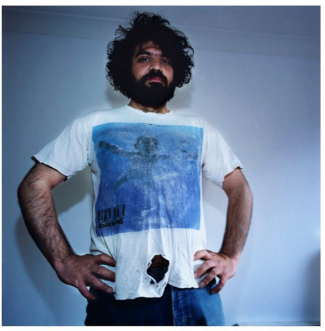 ANDY OLIVER: Let’s start with hearing about ‘The Babak Ganjei Story’ to date. Give us the lowdown on your artistic background, your entry point into comics and Anti-Ghost Studio…
ANDY OLIVER: Let’s start with hearing about ‘The Babak Ganjei Story’ to date. Give us the lowdown on your artistic background, your entry point into comics and Anti-Ghost Studio…
BABAK GANJEI: Haha! Ok… the Babak Ganjei story really begins in 1998 when I started a Fine Art degree At Central Saint Martins. It was a long time ago. Three years of chain smoking in an empty room. You can’t do that now. Once I graduated in 2001 I just drew in my room for a few years and did a few squat shows but I didn’t really know how you operated in that world, or how you made any money. I joined the band Absentee on guitar and later went on to form my own band Wet Paint because it seemed more fun to be broke in a gang.
However, over the last few years I’ve gone back to being broke solo. I think I can’t be bothered to carry that amp any more. All the music and projects and comics I think feed into the same narrative so though it seems disjointed to be doing all this stuff I’ve got my fingers crossed at some point it will all make sense.
A couple years ago I moved into this studio space shared with some other illustrators including Rob Flowers who I’ll be at Safari with. I just figured it was time to fully commit to ridiculous projects.
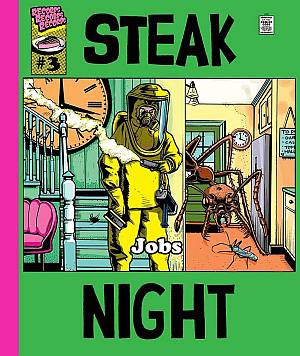 Many readers may have initially discovered your work in the Steak Night anthologies from Records, Records, Records. How did you become involved as part of the Records, Records, Records team and how important were those anthologies in getting your work seen by a wider comics audience?
Many readers may have initially discovered your work in the Steak Night anthologies from Records, Records, Records. How did you become involved as part of the Records, Records, Records team and how important were those anthologies in getting your work seen by a wider comics audience?
My friends Oli and William had started this record label, hilariously called Records Records Records records. Luckily they opted for three Records before the lower case records because it turns out Josh Homme has a label called Records Records records. You can see how this could have become confusing. To be honest we still blame Josh on our lack of success and not the fact that Records Records Records records became primarily a publisher of comics. I’d written this comic book that a record label was going to put out and it fell through then Oli said he would release it so I joined the team.
I then put Steak Night together because I was trying to work out a way of fitting into the world of comics. I had these friends who all drew and wrote but didn’t really have a means of showcasing work. I used to work with Antoine (Cossé) and knew his work was amazing and initially it started as a project to push us to actually get work completed. I’m really pleased with that first Steak Night.
Antoine is now published by Breakdown and in the latest Kramers Ergot. Grace Wilson has a book coming out with Jonathan Cape. Jessica Penfold who used to run Eggs Milk Butter, London’s only comics café, had one of the images from her strip immortalised on the first Paws album. As a showcase anthology I think I can say that did pretty good. And, as for me in the years that have passed, I’ve only gained about five kilos, which I consider a personal success.
Some of your earliest comics work was in the short-form Hilarious Consequences strips. Can you give us some background on the basic premise of that series?
My first book Hilarious Consequences came about by accident. I was writing a page a day documenting what was basically a long term relationship that was going wrong. By the time I’d written about 50 pages I read it back and realised it actually made sense. Finishing a book you didn’t plan to write is quite tricky but I think It worked.
The Hilarious Consequences blog came about as an attempt to find a comic strip in a moment of life everyday. Just trying to train my brain to realise what point of the day is the strip. Then I tried to strip it down to a classic three panel format so I could learn to become efficient with words and timing …and obviously get a million pound contract with a national paper.
Aside from the observational humour there’s also some deft playfulness with the structure of the form in Hilarious Consequences – meta references to speech balloons, thought bubbles and the boundaries of the panel, for example. How much of a learning curve was Hilarious Consequences in terms of understanding the potential of the unique storytelling tricks of the form?
Yeah I really like Charlie Kaufman and all that meta stuff. I think I operate my life like a real sitcom. There’s just no cameras and nobody is watching. I do enjoy the way you can be brutally honest and yet still hidden behind a character. I’m going to need to get cleverer with it though.
A few months ago I was doing a kids workshop at Gosh! Comics and this seven-year-old told me how Deadpool was breaking down the fourth wall. I don’t really know a lot about Deadpool so I had to make sure we were on the same page. Then I had a seven-year old giving me a definition of “breaking down the fourth wall”; it was a real panic. I’m pretty sure I worked out what breaking down that flipping wall meant when I was 25.
Last year you self-published Early Learnings (below right) which was a timeframe-jumping collection of longer personal recollections. Given some of the subject matter – especially those sections that dealt with the casual cruelty of children – was there a cathartic element to that book?
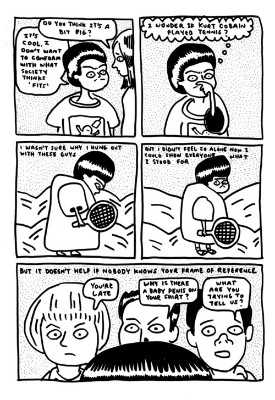 To be honest my comic writing process isn’t very enjoyable. It seems to happen when it happens, and that’s usually in a particular headspace that I need to turn into a joke as a form of catharsis. This is probably why all my books are so depressing. I try not to read them back while I’m doing them because I’m worried they are just too “ugh” .
To be honest my comic writing process isn’t very enjoyable. It seems to happen when it happens, and that’s usually in a particular headspace that I need to turn into a joke as a form of catharsis. This is probably why all my books are so depressing. I try not to read them back while I’m doing them because I’m worried they are just too “ugh” .
Even humorous autobio can be revelatory but there’s also an obvious undercurrent of pathos in your self-referential work. Is there are a sense of vulnerability when working in autobiographical comics and sharing that material with the world?
As I say I think it’s a good medium for this because you can be vulnerable but also you’re hidden behind a character. Ultimately I write comics to connect with people, and hope I’m not alone in whatever ways my brain works, so yes every part of the writing is swamped with vulnerabillity.
I don’t write comics to brag about all the sports cars I own. It’s not the most effective artform for that.
Have you ever considered working on a longer-form comics narrative? Perhaps outside of autobiographical comics?
I’m actually seven pages into a long form narrative comic. It’s an existential nightmare about a man so bored with his life he hires a robot assassin to kill him at a random point in time so he can learn to live out the time he has to the best of his abillity. Except then he changes his mind. It’s called Factory Settings.
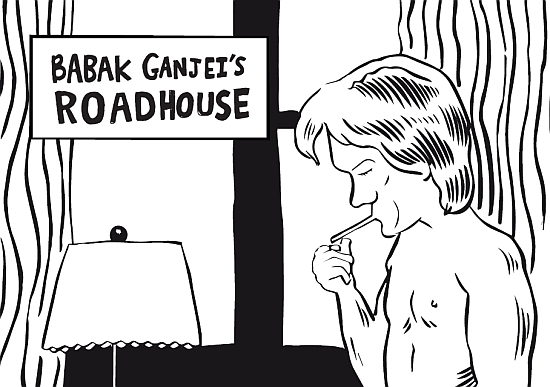
A couple of years back you published Babak Ganjei’s Roadhouse (above and below) – a faithful illustrated recapturing of the infamous Patrick Swayze film but re-imagined with added commentary in the form of quotable soundbites. What was the inspiration for such a unique take on the movie adaptation?
You know how sometimes something can be funny and then it stops being funny and then you keep going until it becomes funny again? That is my process for nearly everything. But also I like to take things and place them in a new context. That’s why each page has it’s own title, so there are 177 individual pieces that make up this whole book. I mainly picked Roadhouse ‘cos I like the idea of someone finding a book like that in twenty years time and thinking “Why the f**k does this exist?”
I’ve come to learn that this doesn’t make for a successful business strategy.
Given that your Roadhouse project was such an unusual and niche approach what kind of reactions has it had? Have you alienated the Swayze purists?
I got a good article on an American website and hordes of obsessives bought it instantly. How they’ve reacted to it I don’t know. I’ve had no hate mail so I’m hoping they are either happy or just confused. I’ll take either of those.
Babak’s ‘blackout’ poetry bringing a fresh eye to the autobiographies of Jeremy Clarkson (left) and Nigel Farage (right)
Turning to your work outside of comics how would you describe your various ‘Blackout’ projects and do you have plans for any new subjects for the big black marker in mind?
Yes, I’ve almost finished blacking out Donald Trump’s awful manifesto Crippled America. It’s been a bit grim and depressing doing that one. My success with those blackout poems is ultimately down to the source material. I may not like him but the reason why the Jeremy Clarkson blackout book was a success is because the man at least throws in some fruity words.
Up to now I’ve done Jeremy Clarkson, Nigel Farage and now Donald Trump. It’s all gotten quite heavy so the other day I bought David Hasselhoff’s biography Making Waves. I’m expecting big things from this one.
What was the thinking behind your recent Some Places Where I’ve Lived postcard set recapturing famous TV living rooms?
I still share a room with my son and he’s getting big now, so space becomes an issue. I was looking at an image of Jerry’s Seinfeld’s living room as a stage set. It seemed so odd without the characters but at the same time so familiar. I realised how much of my life I’ve lived in those spaces. In a way it was fun reclaiming them for myself. I’m thinking I might start painting myself in.
And, finally, what’s next for Babak Ganjei? Are there any new things you’re working on either within comics or in other media that you can tell us about?
If things go to plan I should be doing an art show in February next year. It would be nice to put all this stuff together and see if it really does make sense. I’m also working on this long-form comic, and then the David Hasslehoff book, and anything else that pops into my head that I foolishly convince myself needs to exist.
For more on Babak Ganjei’s work visit his site and online store here and follow him on Twitter here.
Babak Ganjei will be exhibiting as part of Anti-Ghost Studio at Safari Festival on August 27th.
For regular updates on all things small press follow Andy Oliver on Twitter here.





